Best 50 Movies Of The Decade So Far (#20 – #11)
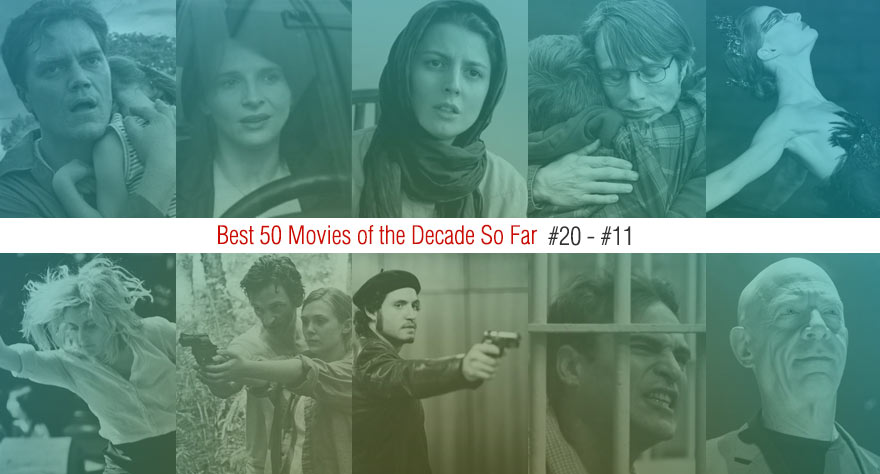
It’s getting toward the end of the week and we’re honing in on our top 10 movies of the decade, leading in with today’s #20-11. This list has been hotly debated and mulled over by our staff the past few months and we’re excited to have a complete list of the 50 movies that stood out to us most in the 2010’s thus far. The first half of the decade has been amazing, so let’s hope the next five years are just as memorable!
Be sure to read up on #50-21 and tune in tomorrow for the final ten films on our epic list.
Best 50 Movies Of The Decade So Far
(#20 – #11)
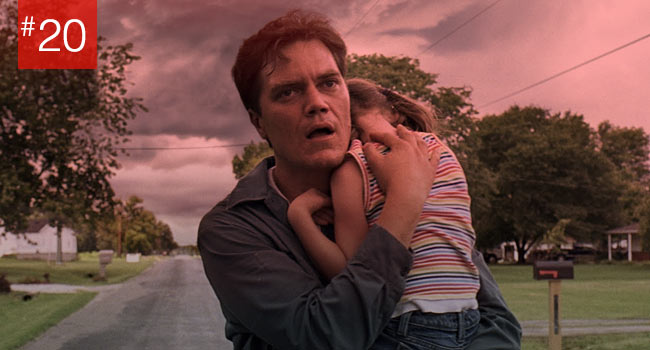
Take Shelter
Anchored by a breathtaking performance by Michael Shannon (a role that graduated him from “that guy” to “THAT GUY”), Take Shelter is one of the scariest films ever made despite not being a horror film. Shannon’s performance as a man losing touch with his reality while desperately fighting to protect his family has the complete spectrum of emotionally complexity—at times sad, at times terrifying, always intriguing. The themes are complex, too, ranging from climate change to the struggles of the middle class in middle America, from religious fable to mental health tale. There are films that can take on multiple readings, and then there is Take Shelter, which can be a completely different film for different people—for me, this is an incredible strength. And can we talk about that ending? OK, no spoilers, but the discussion on what the final images meant was some of the most invigorating discussion of film in 2011. Some saw it as a horror villain coming back from the dead in the final frames, some had the complete opposite view of hope that the main character was getting better in dealing with his sickness. No matter your reading of the final images, however, it is still one of the most visceral endings to a film this decade so far. [Aaron]
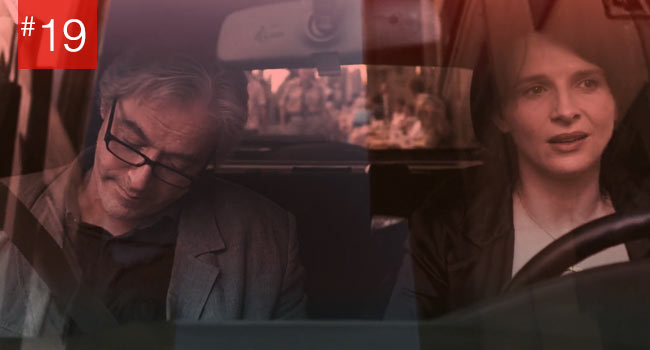
Certified Copy
Certified Copy, by inimitable Iranian auteur Abbas Kiarostami, is about a man and woman who, while on a stroll through Tuscany, fall into something that looks, sounds, and feels a lot like love. William Shimell plays a British author who on a book tour meets a local antiques merchant (Juliette Binoche), who insists on showing him around town while she picks and prods at his brain, absorbing and challenging his unconventional views on life and art. What at first appears to be a touristic on-the-clock romance á la Linklater’s Before films soon reveals itself to be something more abstract, puzzling and dreamlike, with the true nature of the characters’ relationship shifting from scene to scene. One moment, all evidence suggests they’ve only met hours ago; the next, they’re speaking as if they’ve been together for years and years. If watching Shimell (incredible in his first onscreen role) and Binoche (as ravishing as ever) verbally and intellectually spar while framed by sun-drenched vistas isn’t interesting enough for you, the mystery of how they actually know each other will keep you plenty engaged. You’ll find no concrete answers by film’s end, but you’ll be too thoroughly enchanted to care. [Bernard]
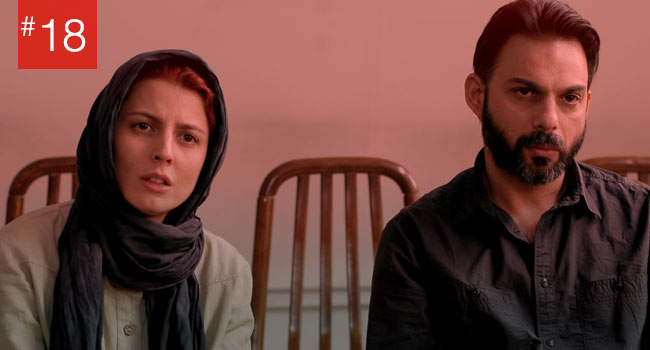
A Separation
There’s a reason Asghar Farhadi’s A Separation steamrolled through the festival circuit in 2011 as well as (or, even better than) any foreign art-house film in recent memory. It’s just that good. Detailing the troubling moments of an Iranian marriage, Farhadi finds a way to encapsulate worldviews, ideological perceptions, and every major component of family dynamics, into a two-hour roundhouse kick to the gut. Nader (Peyman Moaadi) and Simin (Leila Hatami) are the couple in question, and at the heart of A Separation is their 11-year-old daughter Termeh (Sarina Farhadi), torn between two loving parents. Most people in the West have never heard of these actors before this film, but they sure took notice when all three of them shared best acting honours at the Berlin Film Festival, where the film won the Golden Bear, on to its way to a Golden Globe and Academy Award. The realism created by the powerhouse acting, and one of the most perfectly constructed screenplays of the century so far, allows Farhadi to grow the story beyond the restrictions of a specific country’s conservative shackles, and into a fully fledged universal tale. When family gets in the way of family, and wrong choices turn to dire moral consequences, who can’t relate? Not an easy one for repeat viewings, but one that made a singularly deep impression in the past five years. [Nik]
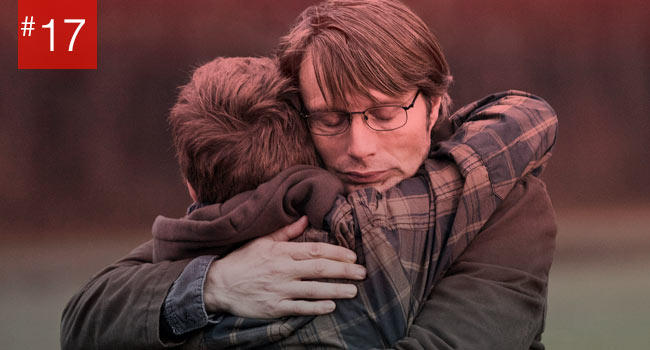
The Hunt
I never thought I would hold in such high regard a film about a man wrongly accused of being a pedophile. And yet. From director Thomas Vinterberg and starring a ridiculously good Mads Mikkelsen comes The Hunt from 2012. The film is remarkably uncomfortable to watch, but not for why you might think. Yes, the topic of pedophilia is unsettling, but the fact that Mads’ character is wrongly accused—and the fact the viewer knows it—actually softens that portion of it. It’s the aftermath of the accusation that ratchets up the film’s intensity to unsettling levels. A man who was once a pillar of the community isn’t even afforded an “innocent until proven guilty” consideration. What the child said becomes gospel, the man she accuses becomes the cardinal sinner, and the small-town mob that once embraced him becomes the congregation looking to cast out the devil. And it could happen to you. Try to forget that after watching this. [Michael]
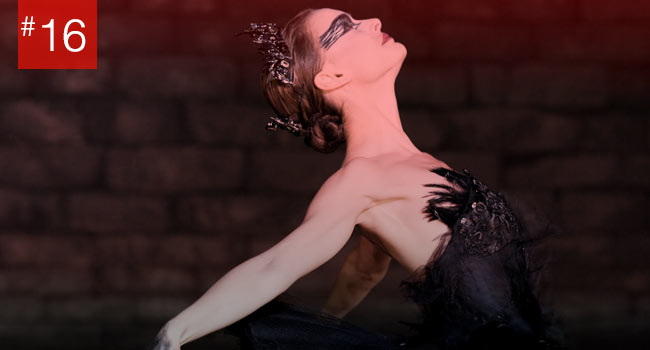
Black Swan
An artist’s pursuit of perfection and the starring role in Tchaikovsky’s Swan Lake causes her to unravel, losing touch with reality in Darren Aronofsky’s Black Swan. This frightening psychological thriller may be writer/director Aronofsky’s most fully realized work to date, combining the intense terrors of his stylistic and shocking Requiem For A Dream with his more intimate, empathetic approach in The Wrestler. In fact, Black Swan shares a lot of similarities with The Wrestler in that both films feature performers that love their craft above all else, willing to sacrifice their own health or happiness in the hopes of achieving artistic integrity. As opposed to Mickey Rourke’s aging wrestler Randy “The Ram”, Natalie Portman’s Nina takes a path to artistic enlightenment that involves an uncertain blend of truth and fiction, which threatens to drive Nina insane. There are the paintings that move on the walls, the was-it-all-a-dream lesbian sequence and of course the most terrifying hangnail in film history. All these moments create an aura of anxiety until the film climaxes with a beautiful, stressful sequence during a performance of Swan Lake, one that Nina performs perfectly. However, was it worth what it cost her? [Zach]
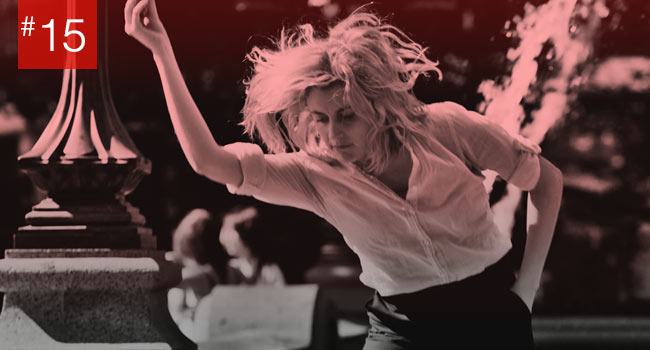
Frances Ha
I often find my favorite films are ones where I feel both loathing and love, bewilderment and recognition, and where a perfunctory analysis just doesn’t seem to suffice. I’m not calling Frances Ha the great think-piece of our time, but Noah Baumbach and Greta Gerwig’s tale of a 27-year-old at odds with her life and in a place of limbo around her career, her love-life, and—most painfully to Gerwig’s Frances—her friendship with her best friend and roommate Sophie (Mickey Sumner), I was left with conflicting emotions. What stuck with me most about the film was the way in which I found myself identifying with this seemingly clueless character. Her behavior and conversations are so typical of the urban middle class artist of this generation, even if somewhat inflated. Her painful interactions with others as she ignores social queues, caught in a place of distracted self-absorption, only occurs when at the precipice of deciding who one wants to be. I identify because I went through it myself, but I appreciate it because Frances Ha captures a perfect snapshot of what is now the new norm among young adults—who seem to stay younger longer, but whose convictions, deep felt friendships, and ambitions are as strong as any generation before them. It’s a rare film that captures an emerging behavioral trend, finds the humor in it, but doesn’t degrade or condescend to its subject. [Ananda]
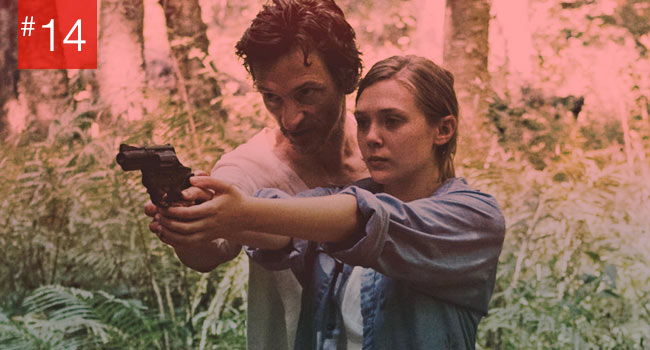
Martha Marcy May Marlene
Martha Marcy May Marlene is a completely spellbinding film that grabs you from the first scene and doesn’t let go. The story of a girl trying to assimilate back into society after living at a cult commune, the film works subtly through its editing and performance to feel much more dangerous than anything you actually see onscreen. One of the best editing films of the decade, it whirls back and forth from past to present through match-cuts and other tricks. Its technique puts the viewer into the troubled mind of its protagonist. We’ve seen a lot of films about the cult experience—some of them are good, some bad, but none are as intensely felt as Martha Marcy May Marlene. With its parts, the film should feel cold and a little too calculated, but its movement gives it liveliness. While also being on the edge of my seat from the thrills, I experienced almost every cut with a “how did he do that” intrigue. This could have killed the momentum of the film, especially considering the tone of Martha Marcy May Marlene, but it works wonderfully here. Elizabeth Olsen’s debut performance (discounting a cameo role in one of her sisters’ films) is something special. She is partnered by John Hawkes in powerful role worthy as a follow-up to his Oscar nominated turn in Winter’s Bone, a similar character, but with an entirely different sort of intensity. [Aaron]
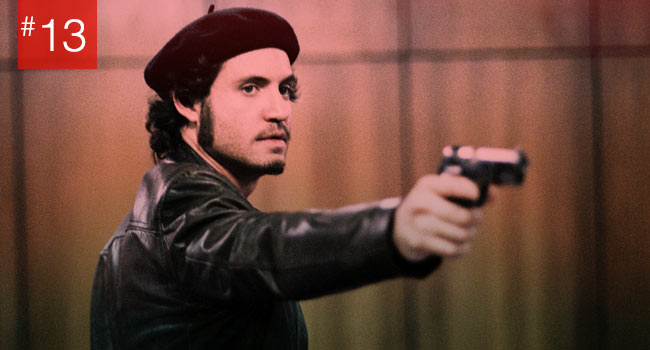
Carlos
If there was ever an unsung performance of the past five years it would have to be Edgar Ramirez’s portrayal of Venezuelan terrorist Ilich Ramirez Sanchez aka ‘Carlos’. Ramirez gained and lost 35 pounds for different sections of the film. Ramirez is ruthless as the South American who will kill anyone, friend or foe, who stands in his way. Carlos started a worldwide terrorist organization and caused mayhem on multiple continents, bombing and shooting his way from one country to another. Oliver Assayas depicts all of this in a five and a half hour opus that is never boring for a single moment. Assayas shot the film in three different continents over seven months and while there are many memorable moments in the film (a lot of them are tense sequences involving some sort of mayhem) none stand out as much as the 1975 OPEC raid in which Assayas dedicated a staggering 120 minutes of the 330 minute runtime. The entire sequence feels like a movie onto its own (and honestly it kind of is its own film) but doesn’t feel out of place within the entire arc of the film. Carlos originally aired for French TV and was eventually shown in US theaters before Criterion released it for home viewing. Assayas’ film is monumental. A grand spectacle that is seen, by us at least, as one of the towering achievements of the last five years. [Blake]
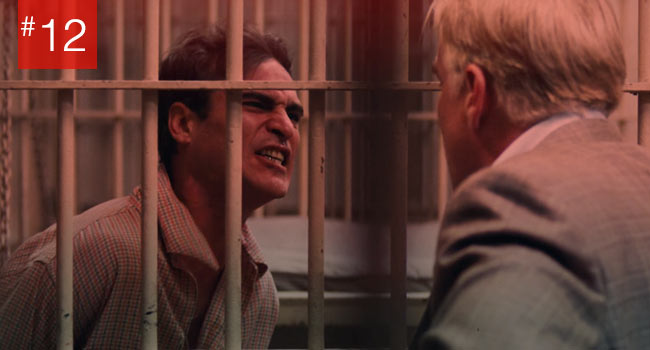
The Master
There was quite a gap after Punch Drunk Love, but when Paul Thomas Anderson returned with There Will Be Blood, he returned like a boss. And then, The Master happened. The only straight line one could draw to it from anything Anderson directed previously was the director’s incredible knack for pulling out career-defining performances from his actors. This time around, it’s Joaquin Phoenix who gets to bathe in the cinematic glory of Anderson’s gift to turn the complex into the fascinating. Continuing his dig into the American past, The Master follows Freddie Quell (Phoenix, like you’ve never seen him before) as he wanders from one job to the next alongside thousands of other veterans of the Second World War. He meets self-made ideologue Lancaster Dodd (Philip Seymour Hoffman’s final masterpiece) and his wife Peggy (a piercing Amy Adams), and his life changes. Or, does it? This is PTA dabbling in psychoanalysis, toying with the origin of cults, and indulging in limit tests of cinematic storytelling. It’s dense, and it doesn’t as much as sniff at the thought of follow conventional three-act structures, which The Master turns into an advantage. I was left with an unquenchable feeling, egging me to return and repeat the experience. Also, it gets major bonus points for allowing cinematographer Mihai Malamare Jr. to make magic with 70MM. [Nik]
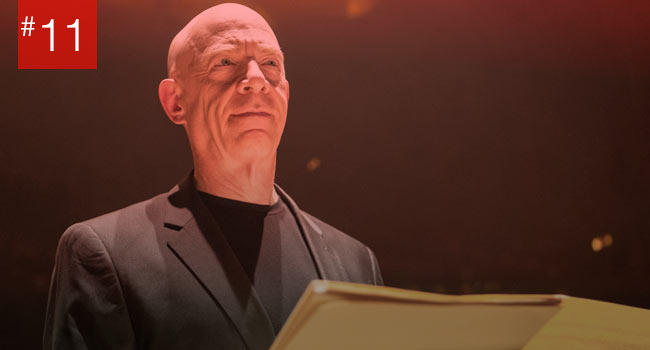
Whiplash
I didn’t see the short film that was Whiplash’s original format before watching the feature film, but I do recall thinking before my initial screening that a director as young and inexperienced as Damien Chazelle seemed unlikely to impress me. 100 minutes later I let go of my grip on my chair’s arm rests and reminded myself to judge not lest I be judged. I’ve seen Whiplash an additional three times since catching it on the festival circuit, always with friends who haven’t seen it yet and I’m constantly peeking glances to see if they get as worked up as I do. And I do. Every. Time. A simple enough concept, the film follows Andrew (Miles Teller), an aspiring drummer at an elite music school. The school’s bad-boy dictator of a conductor, Fletcher, recruits Andrew into his studio band and then proceeds to mentally (and sometimes physically) torture Andrew into being a better drummer. Andrew is pushed to the very edges of his sanity and his abilities, and the very real argument for how to teach talent and inspire genius becomes a battle of wit and stamina. Edited like an action film pulsing to the fast paced and sporadic beat of idiosyncratic jazz, Whiplash assaults the eyes and ears with the same vigor its main character uses to hit stick to drum. Oscar winner J.K. Simmons deserves every inch of that gold statue for Best Supporting Actor, playing Fletcher as calculatedly cruel and complexly evil. It’s the sort of role that comes around less than once a decade and Whiplash isn’t likely to see an equal any time soon. [Ananda]
See the rest of our Best Movies Of The Decade lists!
View Other Lists of this Feature:
Best 50 Movies Of The Decade So Far (#50 – #41)
Best 50 Movies Of The Decade So Far (#40 – #31)
Best 50 Movies Of The Decade So Far (#30 – #21)
Best 50 Movies Of The Decade So Far (#10 – #1)
